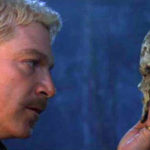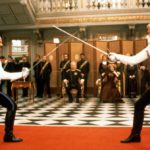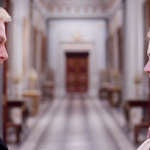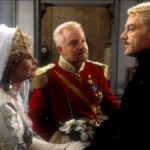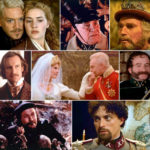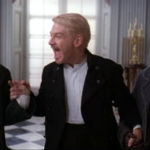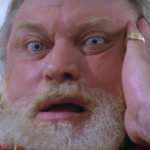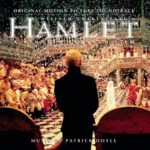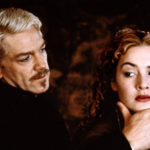At one time it was the Olivier version that was the benchmark against which filmed versions of Hamlet were measured, but these days the mellifluous knight seems dated. The world of Shakespearian interpretations has moved on. My preferred choice for a standard would be the 2009 RSC version, directed by Greg Doran and with David Tennant as the Dane. It is clear as a bell, funny where funny is required, tragic too but the tone is of a very menacing Elsinore. It has much to say about our surveillance society, yet strikes at the heart of Hamlet’s dilemma, caught on the cusp between reason and instinct.
It seems odd therefore to go back to Kenneth Branagh‘s 1996 adaptation, based on a previous RSC production where Adrian Noble was at the helm. when he was in his full pomp and circumstance of Shakespearian adaptations, though this is to my mind the better order to see these versions.
Why? Because Branagh is something of a halfway house, a stopping off point from the traditional notions of Hamlet en route for the darker hinterland of the human psyche portrayed in recent productions. Perhaps this is not surprising, given that Branagh sees himself as a latter-day Olivier, or at least paying considerable homage to the great man. He even played Larry with no little aplomb in My Week With Marilyn.
Compared to Doran’s harsh, paranoid, monochrome Elsinore, Branagh’s is lush, lavish, colourful, awash with pageantry, but despite being set in Blenheim Palace, an unlikely stand-in for medieval Denmark, is decidedly Victorian in decor, costume design and facial hair: the gentlemen are liberally bewhiskered and don their military attire as if fresh back from the Crimea, where the ladies are frequently encumbered by stiff and gaudy frocks.
It is also populated by a stellar cast, such that it reminds me of a football manager who has recruited so many thoroughbred players he can’t accommodate them all in the same team; if you can imagine a star centre forward playing at left-back, then think of Jack Lemmon of all people, fine Oscar-winning actor that he was, playing Marcellus and looking like the proverbial fish on a bicycle. Perhaps I’m being unfair, since most of the cast acquit themselves much more than adequately, and that includes Charlton Heston as the Player King, Robin Williams as the comically mocked Osric and Billy Crystal as First Gravedigger – unorthodox casting, to put it mildly, just as Gérard Depardieu was never my vision of Reynaldo. Hey ho.
In fact, this film is a who’s who of the great and the good. Neither does Branagh limit his casting prowess to the actual roles in the play, since a good number more megastars of British theatre and film make unscheduled appearances by virtue of flashbacks to record characters mentioned in passing. For example, Priam and Hecuba are indeed mentioned in the Player King’s monologue, but never are they revealed on stage – though in the person of the esteemed John Gielgud and Judi Dench both make brief appearances here. When did you last see Old Norway? He made it too, looking much like John Mills. Guess what? A cameo for Richard Attenborough as an ambassador. Even the late lamented Yorick clowns around, courtesy of much-loved comedian Ken Dodd!
Nods to every renowned performer notwithstanding, it would be too easy to be distracted from the point and purpose, were the core cast not well-chosen actors with a heritage of classical stage performances. Brian Blessed appears hauntingly as the ghost with startling blue contact lenses; Kate Winslet is a winsome Ophelia; the agreeable Richard Briers does the pompous buffoon Polonius; and Julie Christie and Derek Jacobi pop up at Gertrude and Claudius.
I respect and admire Jacobi enormously, though I wish I had heard the depths of self-loathing in his soliloquy, “Oh, my offence is rank…” as beautifully articulated by Patrick Stewart in Doran’s depiction, and indeed the full horror and frustration of Gertrude’s “O Hamlet, thou hast cleft my heart in twain.” Jacobi’s Claudius is measured, naturalistic but holding his cards close to his kingly chest. He retains a veneer of normality that betrays few clues of the turmoil behind, yet the opportunity to use Hamlet as scapegoat comes as a blessed relief, communicated largely through body language.
Final word in this litany of talent to two fine actors I’ve recently seen perform brilliantly on stage (see here and here): Tim Spall is Rosencranz and Don Warrington Voltimand. When a prodigious talent like Simon Russell Beale is relegated to Second Gravedigger, you know precisely where the budget has gone.
Everywhere you look there is opulence, but also a very literal translation, shorn of ambiguity. Portraying Ophelia naked in the arms of Hamlet as lovers is no more than a gentle hint in the play, yet here it is accorded a flashback that leaves you in no doubt – somehow this was an unwelcome and literal reading. In the same way, other flashbacks rob from us the power of imagination concentrated in the visions of Shakespeare’s words, which will suit some, though personally I preferred the subtlety and ambiguity.
In fact my main three issues with this film would certainly include the distractions of scope and and an ornate production design, where stripped back might have been more effective; and the third is along the same lines – it is complete and comprehensive to the point where scenes and dialogue are included that have not been seen in the play for generations. This is truly a belt-and-braces Hamlet.
The script takes the First Folio edition of Hamlet and conflates it with additional scenes taken from the Second Quarto and other sources, resulting in a 4-hour production where rarely a production lasts more than three – so perhaps no surprise this film flopped at the box office. Even the hardiest of audiences will struggle to stay focused through a succession of wordy exchanges for that long, particularly when much of it includes nice-to-have history and subplots, plus much quick fire verbal tennis for the hell of it, perhaps closer to Stoppard‘s Rosencrantz and Guildenstern Are Dead (which quotation is restored in this imprint!)
It’s a good thing to have this recorded for posterity and completeness, but it does not concentrate our minds on the core elements and emotional intensity of the play. It also subtly changes some scenes and dialogue in ways that made me wonder if my memory was playing tricks : it wasn’t.
This is a bold and dazzling vision in its own way, but maybe it would have benefitted from being bolder still to hit a home run. So how does a director focus effort on the core of the play, you might justifiably ask? Branagh’s answer is to hone the poetry of the iambic pentameter and visuals, and tone down some of the raw, taut emotion and comedy. The laughs, pricking pomposity with a lance, are heavily restricted, and I don’t think the play is better for that omission.
Branagh himself is a diffident Dane. Not that Hamlet does not rant and rage on occasions, but several times I felt there was more than could have been squeezed dramatically from situations and in soliloquies. This is a highly intelligent and eloquent Hamlet, one with hidden depths but not necessarily as expressive of his emotions. This is ironic, given that he throws the kitchen sink at the production, both as actor and director, but perhaps his judgement of scenes is sometimes out of kilter.
For example, Branagh quotes the “too, too solid flesh” speech as if mildly perturbed by his neighbour playing music too late, compared to the gut-wrenching pain endured by Tennant’s Dane with the same words. This Dane might be quicksilver in the tongue but he fails to mock the boys or Polonius with the fortitude you might expect. Being fairly po-faced, he is at his best in the throes of serious contemplation – but unlike Olivier his “to be or not to be” does not involve almost hurling himself on to the rocks, but sticking a stiletto into his mirror image.
Ah yes, the visuals, quite apart from the trappings of grandeur. Poor Ophelia strapped into a straightjacket and thrown in a Victorian asylum cell, for example; Rosencrantz and Guildenstern arriving on a steam train; a sword fight that starts in the hall of mirrors and progresses up the grand two-tiered staircase; a grand library populated with beautiful books; and indeed the Norwegian army invading in number.
Watch and enjoy Branagh’s dazzling enterprise, but if you want true psychological insights it’s worth returning to Doran and other modern versions.


